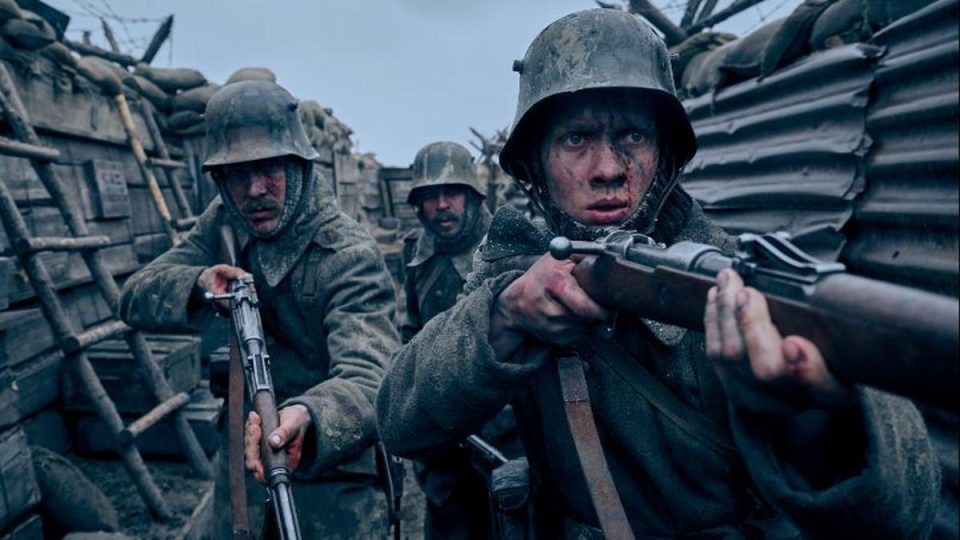
All Quiet on the Western Front review: A meditation on meaninglessness of war

In a scene from Netflix’s All Quiet on the Western Front, two young soldiers sit on the latrines in the woods, discussing the war they’ve been hurled into. “All everyone wants to know about is the battles we’ve been to,” one says after reading a letter from his wife. It’s a discomforting sequence that mixes the relief of excretion to the tense contemplation of mortality. In war, even the most basic of bodily functions comes attached with this draining sense of fatalism. No wish for peace, even if functional, can be summoned without the shadow of jeopardy.
All Quiet on the Western Front, Swiss director Edward Berger’s German-language anti-war saga, emerged as one of the most successful films at the Oscars, winning in four categories: international feature, cinematography (James Friend), original score (Volker Bertelmann) and production design (Christian M. Goldbeck, Ernestine Hipper). While it re-asserts the relevance of a classic, it also underlines the topicality of war as a route to making prescient art.
Also read: ‘All Quiet on the Western Front’ review: A meditation on the meaninglessness of war
This is the third adaptation of Erich Maria Remarque’s novel by the same name, but the first in the language of the book’s origin. Paul Baumer, played by newcomer Felix Kammerer, joins a couple of his school friends in what the group believe will be a casual saunter towards glory. Instead, Paul and his group of mates discover that they have unwittingly launched themselves into endless bloodshed and chaos. To the extent that after a point, one act of violence fails to distinguish itself from the other. The bodies pile up as commotion, which replaces the aesthete of action. Dirt and blood begin to look the same as do the men who, if it weren’t for the naivety of their hope, are as good as dead.
A companion to anti-war poetry
The battle sequences are the noise that Paul and his friends must work against to register a hint of humanity. It’s in their conversations, their yearnings for the past — as opposed to the future — that the pointlessness of war comes through. In the shadow of the ongoing Russia-Ukraine war, it feels like a topical insight, the kind of real-world relevance that rarely coalesces with the news in such fine detail. It also explains why despite being unfancied by critics, the film has won the accolades that it has. There is cynicism to the moment-tapping politics here, but there is also, of course, exceptional craft to back it with.

Berger’s film is more a companion to anti-war poetry than modern aphorisms against violence. Its meadows, snowy backdrops and stunning visual artistry, pit the banal violence of a meaningless war effort against the beauty of the seen but ignored. There is simply so much to like and love about our world, and yet we squabble over the miniscule or the meaningless.
The novel got its name from an actual report prepared by the German army that, rather minimally, summarised the first world war as a needless exercise in human egotism. Here in the film, that egotism is shown to be sufficiently painted in the form of politicians wanting to do something about it. It’s a side of the German narrative that is, of course, shipped to a lesser extent compared to the one that consumed the planet a decade later. In some sense, there is also a sense of moral salvation here.
Orgies of gunfire and grenades
There are also, however, issues with the film. The book used sobering minimalism to counteract the explosiveness of battle, or at least how it exists in the imagination of the people, and yet in Berger’s imagination, the violence continues to be relevant. At times, All Quiet on the Western Front, isn’t quiet at all. It cheerfully manufactures the kind of stormy orgies of gunfire and grenades that only dilute the impact of the gestation the book was meant to evoke.
Also read: India roars at OscaRRRs: From ‘Naatu Naatu’ to ‘The Elephant Whisperers’
It’s also one of the reasons why a film that has been regarded so well internationally has been panned at home. That said, taken at face value, with the caveat that the name may just have been a ruse to universalise a native idea, All Quiet on the Western Front manages to travel, as all good poetry does, without necessitating the knowledge of historical or political inaccuracies.
There is a school of thought that argues that war has become this low-hanging fruit for prestige filmmaking. But then its relevance, too, refuses to abate, as does the prerequisite for craft that makes it essential, if not eternal. There is little that cinema around conflict can engineer in terms of visual grammar that hasn’t already been seen before, but then, so is the inanity of conflict itself. The recurrence of cinema around war, or at least around the worthlessness of it, is simply an echo of the cyclic nature of human stupidity; its predisposition to court disaster and catastrophe as a matter of routine. To which effect, every war film is, in essence, an anti-war film.
Moreover, to every generation undeniably fascinated by Adolf Hitler’s bigotry and politics, there must be a similar requiem of a German story that wanted to desert the battlefield, save from it what it could. There is also a disquieting lesson here that peace, like war, must also regularly be fought for. Maybe not in the trenches of Berger’s film or alongside Paul and his friends or in the colossal context of an epic battle. But maybe in the little things we do, the art and the message we choose to celebrate.

